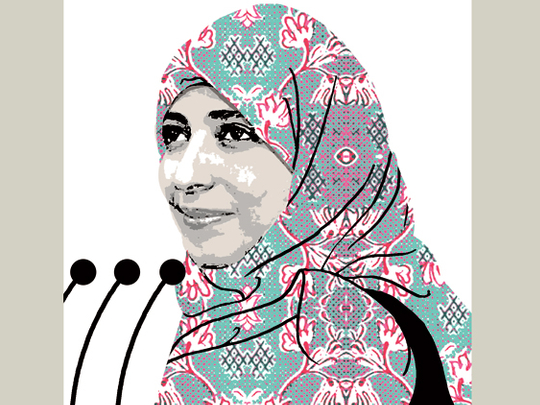
Nobel laureate Tawakul Karman, an easily recognisable Yemeni face wrapped in hijab, was in Canada last week, where I had the pleasure of spending about 24 four hours, on and off, with her and her husband Mohammad, as well as her executive assistant, Arafat, during her very packed visit to Ottawa, Canada.
Her visit to Canada had started on November 20 in Edmonton, Alberta, where she received an honorary doctorate degree from the University of Alberta in recognition of her inspiring leadership. However, her visit to the nation’s capital was very busy indeed. It started with a presentation, in Arabic, to the University of Ottawa, with simultaneous interpretation by two individuals, one of whom was a Yemeni friend of mine, Farooq Aman, who was most impressed with her warmth and humility.
The charge’ d’affaires of Yemen invited her with a group of about 30 Yemenis to a quick dinner on her way to the next engagement. This was a lecture followed by a panel discussion, of which she had the lion’s share of time, to everyone’s delight.
It was organised by a coalition of Ottawa-based Muslim and Arab organisations. I was the official interpreter during that session and the subsequent meetings the next day.
She began her talk with a rousing song, in which I found myself contributing the baritone, egged on by an audience of around 200! It was an inspiring speech and the discussion that followed was quite animated and highly appreciated by the audience.
She made up her somewhat limited command over English with her confidence and control over the audience and I found myself interpreting only occasionally. I was delighted to have the opportunity to recite to her, in that packed hall, the Arabic poem I had written about her role in “Change Square”, Sana’a. She seemed touched by that and asked me for the words the next day.
The next morning, she met a deputy of the foreign minister of Canada, then interacted with about 20 ladies at Amnesty International, where again the discussion was very lively, friendly and at times even amusing.
From there, we went to the office of the Nobel Women’s Initiative in Ottawa — the only such office in the world, given that the number of such women, since the inception of the prize in 1901, is only a dozen!
After lunch, we were off to meet the Canadian Parliamentary Opposition, starting with Thomas Mulcair, the leader of the New Democratic Party (NDP), and his foreign affairs critic Paul Dewar. It was a brief meeting where the two sides appeared to have much in common and where Tawakul seemed to charm everyone.
I believe that most people who have access to and follow the news know a lot about this young, dynamic, Muslim Yemeni icon. For any who do not, she was born on February 7, 1979, in a village near the charming southern city of Taiz, where she spent her initial years in academics, before teaching and subsequently becoming a journalist and activist famed for her participation in the Arab Spring. She also chairs the Women Journalists Without Chains (WJWC) — an organisation she founded in 2005.
She has been in and out of jail for her work. Whenever she was freed — and although a mother of four — she would live in an encampment in the capital of Yemen called “Change Square” — despite all the inconveniences and real risk of injury. During the days of the revolution, her brother Tariq was reported to have been threatened that either he should confine his sister to her house or “those who weaken the whip of obedience would be killed”.
She used to wear the niqab but decided to remove it when she became a public figure, in order to better communicate with people. She is reported to have said: “I do not represent the Al Islah party and I am not tied to its positions. My position is determined by my beliefs and I do not ask [for] anyone’s permission.”
She wrote an article titled ‘Yemen’s Unfinished Revolution’ in the New York Times, in which she blamed the US for its support for the “corrupt” Ali Abdullah Saleh regime in Yemen.
However, when she visited Hillary Clinton in Washington, the body language I observed on TV between the two women was clearly that of enormous warmth and understanding. Clinton probably heard, for the first time ever, the truth about what was happening in Yemen — and it is safe to say that the report and opinion she heard from Tawakul was very different from the broken record of Al Qirbi — namely that Saleh was quite willing to step aside, but only according to the constitution.
Saleh did eventually step down and it is Tawakul, the “mother of the Yemeni revolution”, and the martyrs that we have to thank for that.
Dr Qais Ghanem is a retired neurologist, radio show host, poet and novelist. His two novels are Final Flight from Sana’a and Two Boys from Aden College. His non-fiction, My Arab Spring, My Canada, was published by Amazon.







